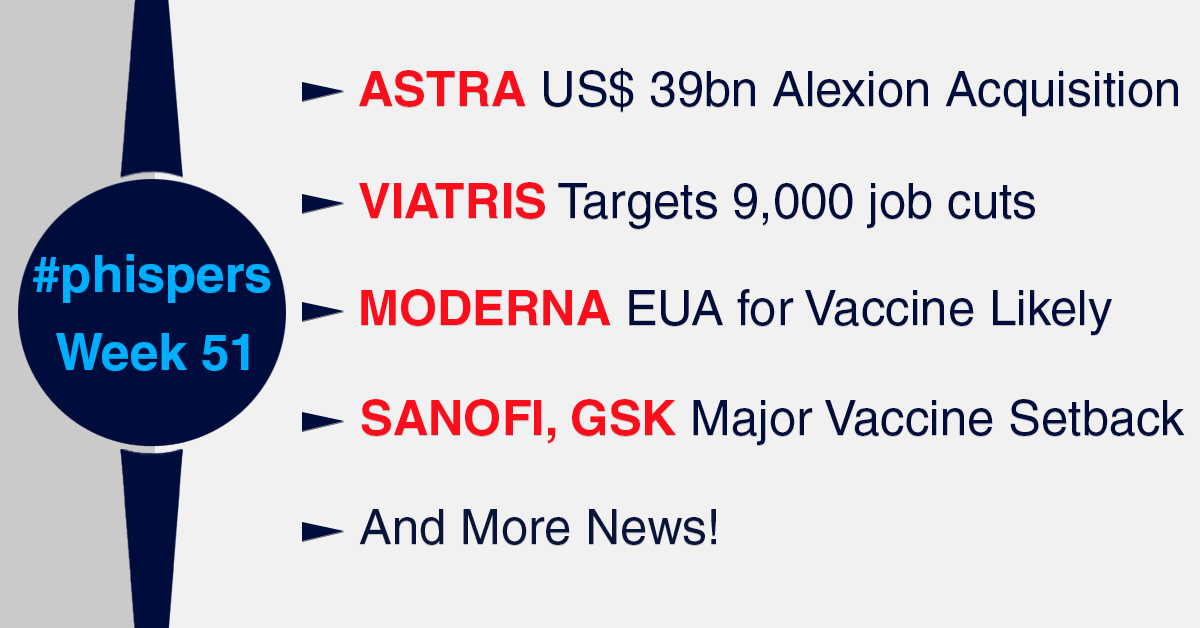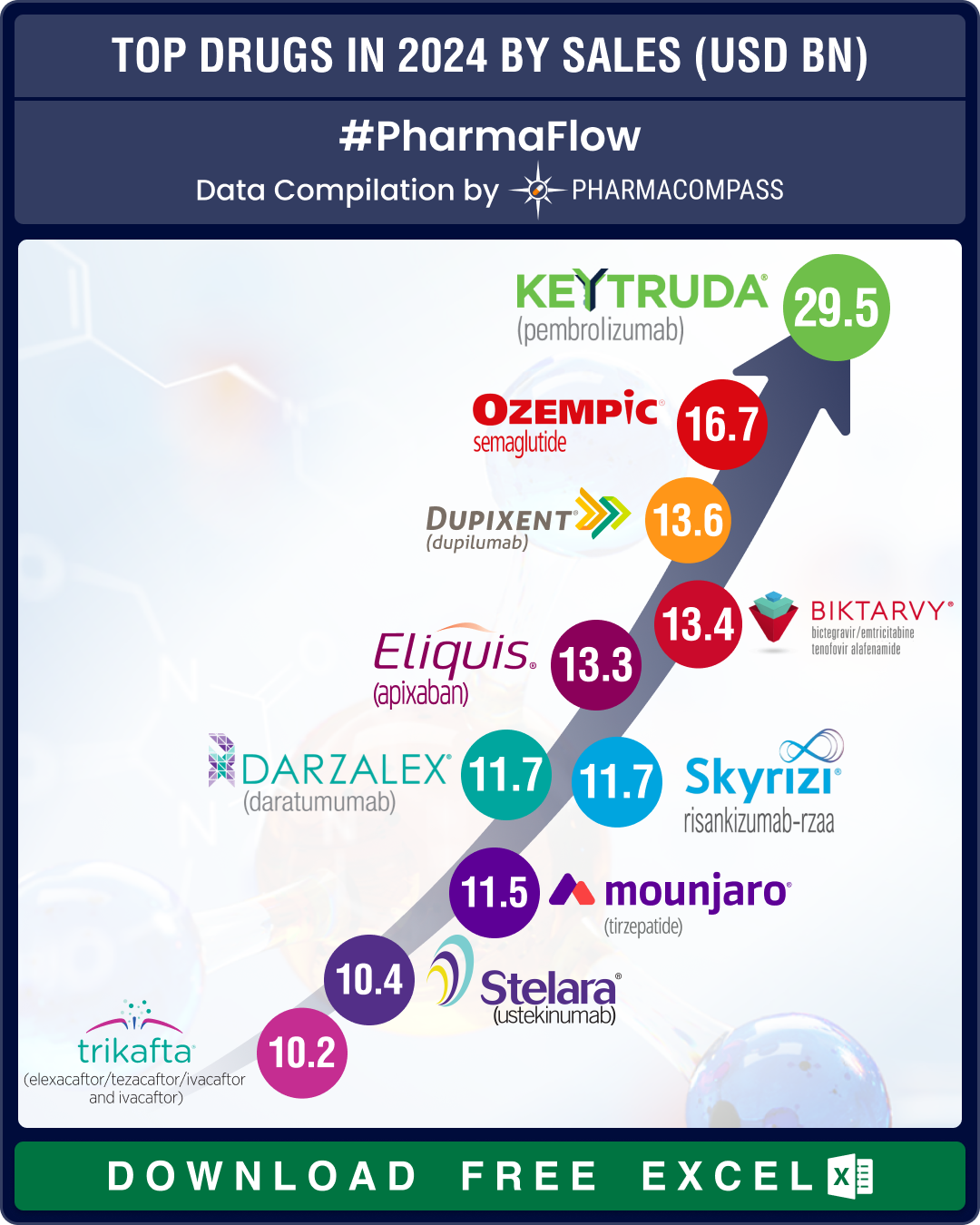
By PharmaCompass
2020-12-17
Impressions: 2562
This week, Phispers brings you news on the biggest M&A deal of 2020 as AstraZeneca announced it is buying Alexion for US$ 39 billion. Viatris, the biggest generic player formed by the merger of Pfizer’s Upjohn with Mylan last month, is gearing up for wide-ranging cutbacks that could eliminate 20 percent of its global workforce and close or sell off 15 manufacturing facilities worldwide by 2024. Novartis’ lipid-lowering therapy — inclisiran — acquired last year through its acquisition of The Medicines Company bagged the European Commission’s approval.
In Covid news, after granting emergency use authorization (EUA) to Pfizer-BioNTech’s Covid vaccine, a US Food and Drug Administration (FDA) panel endorsed granting EUA to Moderna’s vaccine as well. A formal clearance for administration of Moderna’s mRNA vaccine to the public is expected soon. The FDA has also authorized the first at-home antigen test kit for Covid-19 that will be sold over-the-counter in the US. Sanofi and GSK’s Covid vaccine faced a major setback as results from a phase 1/2 trial showed insufficient immune response in older people. And the European Medicines Agency has recommended changing some terms of the conditional approval given to remdesivir as a Covid-19 treatment.
AstraZeneca buys out Alexion for US$ 39 billion in 2020’s biggest M&A deal
Last week, AstraZeneca acquired Alexion Pharmaceuticals, a Boston-based company specializing in rare disease drugs, in a cash-and-stock deal worth US$ 39 billion. So far, this has been the biggest M&A biopharma deal of 2020, ahead of Gilead Sciences’ US$ 21 billion acquisition of Immunomedics that was announced in September this year.
The AstraZeneca-Alexion deal is expected to close sometime between July and September. It is driven by AstraZeneca’s desire to build a stronger presence in immunology and will make its CEO, Pascal Soriot’s target of achieving US$ 40 billion in sales by 2023 a lot more achievable. In 2019, Astra had posted global sales of US$ 23.6 billion.
Alexion’s portfolio includes Soliris and Ultomiris that target C5, a key piece of the immune system. In addition, Alexion’s pipeline includes 11 molecules targeting proteins like Factor D, FcRn and others.
“Alexion has established itself as a leader in complement biology, bringing life-changing benefits to patients with rare diseases,” Soriot said in a statement. “This acquisition allows us to enhance our presence in immunology.”
Last year, Alexion posted sales of US$ 5 billion, led by its blockbuster rare disease drug Soliris. Alexion has set a target of achieving US$ 9 billion to US$ 10 billion in sales by 2025.
Eli Lilly to buy Prevail: Eli Lilly announced this week that it is buying Prevail Therapeutics for US$ 1.04 billion to expand its presence in gene therapy. Prevail develops gene therapies for patients with neurodegenerative diseases such as Parkinson’s disease and dementia. Indianapolis-headquartered Lilly said it expects its 2021 sales to be between US$ 26.5 billion and US$ 28 billion, which includes revenue of around US$ 1 billion to US$ 2 billion from its Covid-19 treatments.
Mylan-Pfizer’s Upjohn combine — Viatris — to offload 15 plants, may cut 9,000 jobs
In July last year, Mylan NV and Pfizer announced a definitive agreement to combine Mylan with Upjohn, Pfizer’s off-patent branded and generic medicines business. The merger got completed last month and the combined entity — Viatris — came into existence.
As a result of this merger, Viatris became the world’s largest generics player with a workforce of 45,000 employees at several sites across the globe.
Within weeks of its formation, Viatris announced it is gearing up for wide-ranging cutbacks that could eliminate 20 percent of its global workforce and close or sell off 15 manufacturing facilities around the world.
This restructuring exercise could put 9,000 jobs on the line. Viatris looks to shave off US$ 1 billion in operating expenses per year by 2024 in order to drive growth in the low-profit, high-volume generics market.
In the short term, Viatris has identified five manufacturing sites that will get affected. These include its oral solid dose plants in Morgantown (West Virginia), Baldoyle (Ireland), Caguas (Puerto Rico) as well as its Unit 11 and Unit 12 API plants in India. Viatris plans to close its north Dublin plant, which makes generic medicines, over the next two years. The company recently divested a sterile injectables site in Poland, Viatris said.
“The actions we are announcing today are consistent with our commitment to optimally design our new company to operate efficiently,” CEO Michael Goettler said in a press release. “This initiative is part of Viatris’ roadmap to ensure we can maximize long-term value creation for shareholders and for all stakeholders, including the patients and customers we serve.”
Wherever feasible, Viatris will seek to find potential buyers for its facilities in order to preserve as many jobs as possible, the statement said.
After Pfizer, Moderna’s Covid vaccine poised to bag FDA’s emergency authorization
Last week, the US Food and Drug Administration (FDA) issued the first emergency use authorization (EUA) to Pfizer-BioNTech’s vaccine for the prevention of Covid-19 in individuals 16 years of age and older. And this week, the FDA staff endorsed granting an EUA to Moderna’s coronavirus vaccine. A formal clearance for administration of the Moderna vaccine to the public could come as early as next week.
The FDA’s staff report is meant to brief the FDA’s Vaccines and Related Biological Products Advisory Committee, which will meet on Thursday (December 17) to review Moderna’s request for an EUA. The FDA released a 54-page report on Tuesday, which concurred with Moderna’s claim of a 94 percent efficacy rate. Moderna is seeking EUA for use of its vaccine in people aged 18 and above.
A group of external medical advisors had recommended Pfizer’s vaccine for an EUA last Thursday, and the FDA granted it an EUA the next day. Shipments of Pfizer’s vaccine to the US began on Sunday.
The scant data in younger teens was a sticking point for the few members of the advisory committee who voted against authorizing Pfizer’s vaccine last week. Pfizer has said it plans to file for full US approval of its experimental coronavirus vaccine by April 2021.
Meanwhile, the US has backpedaled on its vaccination targets. The US now expects to immunize 100 million people with a Covid vaccine by the end of March, the US Operation Warp Speed (OWS) chief adviser, Moncef Slaoui, has said. Slaoui had previously said that he hopes to vaccinate 100 million people by February-end. And in April, it had been reported that OWS aims to receive 300 million doses of the Covid vaccine to vaccinate 150 million people by the end of January 2021.
Home antigen test: The FDA has authorized the first at-home antigen test for Covid-19 that will be sold over-the-counter in the US. The test is authorized for use with a nasal swab for individuals at least two years of age and can be used in asymptomatic individuals as well. The test produces results within 15 minutes and does not require a prescription.
Sanofi, GSK’s vaccine faces major setback; EU restricts use of Gilead’s remdesivir
Unlike Pfizer and Moderna, Sanofi and GlaxoSmithKline have had tough luck with their Covid vaccine. An interim analysis of results from phase 1/2 clinical trials of their adjuvanted recombinant protein-based Covid-19 vaccine showed an insufficient immune response in older people. As a result, the launch of their vaccine has not only been delayed, but the global fight against the pandemic has also received a setback.
Experts say the world needs several options to counter Covid-19. Sanofi had hoped to start a Phase 3 trial of its vaccine this month and had projected that it could produce 100 million doses of its vaccine in 2020, and 1 billion doses in 2021.
The news is also a blow for many governments that have booked millions of doses of the shot, including the EU, the US, and the UK.
Sanofi has traced the problem to an inadequate formulation of their vaccine, Su-Peing Ng, global medical head for Sanofi Vaccines said. Both Sanofi and GSK are committed to continuing work on the vaccine, and plan to begin a Phase 2b trial in February, she added.
The delay could also hurt the vaccine pipeline. Since the Covid vaccine landscape is changing daily, placebo-controlled trials may not be feasible for much longer. If people know they may soon have access to an authorized vaccine, it is likely that they may not enroll in a trial.
Remdesivir authorization in EU: Last month, the World Health Organization (WHO) had said remdesivir should not be used for Covid-19 patients, regardless of how ill they are. In another blow to Gilead’s anti-viral drug, last week the European Medicines Agency (EMA) recommended changing some terms of the conditional approval given to remdesivir as a Covid-19 treatment. The new terms make clear the conditions under which remdesivir can be used.
As per the new terms of the conditional marketing authorization for remdesivir in Europe, a patient could need “low- or high-flow oxygen or other non-invasive ventilation at start of treatment.” Remdesivir is already indicated for use in Europe in patients aged 12 years and older with a body weight of at least 40 kgs, who are also suffering from pneumonia and require oxygen support. In October, the European Union had agreed to pay over US$ 1.2 billion (over €1 billion) to Gilead for a six-month supply.
Novartis’ RNAi therapy for lowering cholesterol bags EU approval
Novartis’ US$ 9.7 billion acquisition of The Medicines Company last year finally bore some fruit as the European Commission cleared its lipid-lowering therapy, inclisiran, now branded as Leqvio, to treat adults with high cholesterol.
However, analysts say the Swiss drugmaker faces an uphill task to break even on The Medicines Company buyout.
“This approval is based on the results of the robust ORION clinical development program, where Leqvio provided an effective and sustained low-density lipoprotein cholesterol (LDL-C) reduction of up to 52 percent in patients with elevated LDL-C, despite maximally tolerated statin therapy,” Novartis said in a statement. Inclisiran is a two doses a year treatment, after the patient has received two starter doses three months apart. The drug’s administration by a healthcare provider could increase patient compliance.
Inclisiran is the first and only approved small-interfering RNA (siRNA) low-density lipoprotein cholesterol (LDL-C) lowering treatment in Europe, the statement added. Novartis hopes to leverage its existing Entresto team and heart disease know-how to market inclisiran in Europe.
The EC marketing authorization is valid in the 27 EU member nations. Leqvio is also under review by the US Food and Drug Administration (FDA) for adults who have elevated LDL-C while being on a maximally tolerated dose of statin therapy.
The Swiss drugmaker had more good news to announce. On Tuesday, the FDA advisory committee scrutinized Novartis’ application for Entresto (sacubitril/valsartan) and gave a positive feedback on the use of this therapy in heart failure patients with a preserved ejection fraction (HFpEF). This indication is currently without a therapy. The FDA panel voted 12 to 1 on the use of Entresto in chronic HFpEF patients. If approved, the therapy could bring in US$ 5 billion in sales per year for Novartis.
The PharmaCompass Newsletter – Sign Up, Stay Ahead
Feedback, help us to improve. Click here
Image Credit : #Phisper Infographic by SCORR MARKETING & PharmaCompass is licensed under CC BY 2.0
“ The article is based on the information available in public and which the author believes to be true. The author is not disseminating any information, which the author believes or knows, is confidential or in conflict with the privacy of any person. The views expressed or information supplied through this article is mere opinion and observation of the author. The author does not intend to defame, insult or, cause loss or damage to anyone, in any manner, through this article.”








